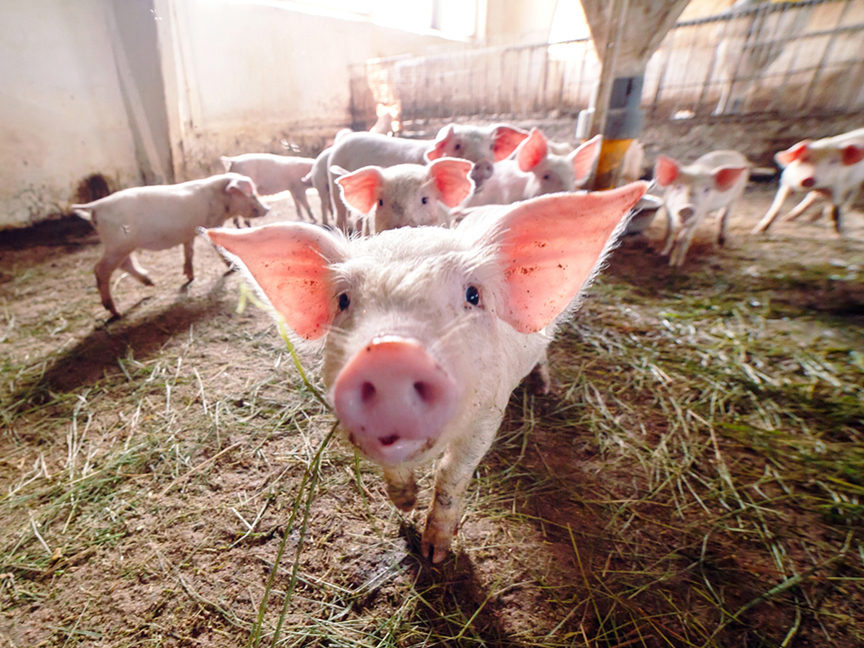
Home » Broken Food Supply Chain Has Some Consumers Buying Their Own Pigs
Broken Food Supply Chain Has Some Consumers Buying Their Own Pigs

June 4, 2020
Broken supply chains have left farmers across the globe with mounds of food waste. Facing the prospect of plowing over fields and euthanizing pigs, some of these farmers — like Clint and Shelly Pinkelman — are mitigating their losses by going straight to consumers.
When coronavirus outbreaks forced shutdowns at Smithfield Foods Inc., Shelly sprung into action. She secured sales for their small Nebraskan farm through a grapevine of friends and family and booked spots at meat processors that can handle individual animals. About 300 of the 600 hogs that were ready for market have been sold, Clint said, and many of them fetched above-market prices.
“We’ve had people contact us for our hogs from Colorado, western Nebraska, way up in South Dakota, and we tell them ‘Listen, there are other hog farmers like us. Go talk to your local guy and help them out, we’re not the only ones hurting,’” he said.
It’s a scene that, in varying forms, is playing out around the world: Indian watermelon growers are loading up tractors to sell fruit in nearby villages; U.K. wholesalers are redirecting supplies that restaurants no longer want; Florida blueberry producers are setting up roadside stands.
The new workarounds can limit some of the waste that’s piled up. Saddled with snarled transportation, labor crunches, restaurant shutdowns and plant closures, farmers were forced to smash eggs, dump milk and cull hogs. While the direct-to-consumer sales are unlikely to recover all of that, they can at least help to make a dent and create an additional avenue for people to get access to food at a time when grocery stores have had difficulty keeping shelves stocked.
Some farmers, especially in developing countries where supply chains can be brittle even in normal times, could see the changes last beyond the pandemic. Startups are creating online marketplaces to help connect growers directly with buyers, and producers are on waiting lists to get added even as lockdown restrictions ease.
Even in the U.S., some of the new selling methods will stick around after plants are back up and grocery shelves are stocked. Consumers are putting more thought into where their food comes from and doing more long-term meal planning, said Dana Gunders, the executive director for ReFED, a nonprofit that focuses on reducing food waste in the U.S. Demand for things like CSA (community-supported agriculture) boxes of produce has gone up and will likely stay that way, according to Jennifer Molidor, a senior food campaigner at the Center for Biological Diversity.
For hog farmers like the Pinkelmans, finding consumers to directly buy animals can mean the difference between bankruptcy and staying afloat. Even as American meat plants start to reopen under an executive order from President Donald Trump, the facilities are running below normal capacity amid worker absenteeism. The pork industry is also working through a backlog of animals that’s denting overall demand, so Clint and Shelly say they expect to keep selling individual animals direct to consumer for some time to come.
“We’re either going to get on top of this or we’re going to lose,” she said.
The big question here: What does a consumer do once they’ve secured their own hog? The answer: Find a local processor, sometimes called a meat locker, that can take on the task of turning a pig into pork chops.
Those processing slots are filling up fast, said Rebecca Thistlethwaite, director of the Niche Meat Processor Assistance Network, which has around 1,500 small producer and processor members. In some places, the wait is now as long as 12 months, she said. Some farmers are relying on mobile slaughter trucks that have shorter wait times, but then the carcass still needs to be broken down further by a butcher.
Often, as in the case of the Pinkelmans, the farmers help set their customers up with meat lockers, but some are just selling live animals and letting the buyers figure out what to do.
“Maybe there’s a hunter in the family or someone knows how to kill an animal,” Thistlethwaite said. “At the very least, there are YouTube tutorials that work, especially for smaller animals like chickens.”
When Quebec, Canada, went into lockdown a little more than two months ago, Gaspor Farms’ market disappeared overnight. The family business, which sold 95% of its milk-fed piglet products to high-end restaurants in the province and beyond, took to social media to find new customers. The farm started to offer assortment boxes of sausages, ribs and ham to consumers. The company in May sold 300 to 400 boxes a week and was working on a new e-commerce platform.
Changing the model, “it helped keep the company alive,” Alexandre Aubin, co-owner, said. “I’m not saying it’s as much as before, there’s still an after-shock, but we’re adjusting better and better.”
Finding buyers isn’t always easy.
Vinod Patidar is a fruit and soybean farmer in the central Indian state of Madhya Pradesh. This year, he planted about 4 acres of papayas, but was forced to plow over close to half that. The rest of the fruit he’s still trying to sell, including directly to consumers, but he’s having trouble finding customers.
“I tried selling papaya in nearby areas but nobody was willing to buy,” partly because people are worried about virus transmission in the hand-to-hand sales, he said. He estimates he’ll lose 350,000 rupees ($4,645) to 400,000 rupees from the papaya corp this year, compared with a profit of about 400,000 rupees last season.
Selling Challenges
And while the new channels are cutting down on some of the food waste, there are other challenges, said Gunders of ReFED. Larger facilities are held back by their rigid production infrastructures, and for farmers, it can be hard to pivot to direct-to-consumer simply because of the large scales of production they work in, she said
“A grower can’t just take a semi-truck load of broccoli to the farmers’ market — it’s hard to deal in those volumes,” she said.
That’s where startups like India’s Ninjacart, which buys directly from farmers and sells to retailers and restaurants, see an opportunity. Producers are looking for multiple channels to connect with customers, according to co-founder Vasudevan Chinnathambi. The company has recently added 120 farmers to its platform and has a “huge backlog” of others waiting to get on, even as lockdown restrictions ease in the country, he said.
In Malaysia, Alibaba Group Holding Ltd.’s e-commerce site Lazada is also adding more agricultural businesses and farmers onto its platform. Farmers from Cameron Highlands, Malaysia’s key vegetable-growing area, are selling about 1.5 metric tons (3,307 pounds) of vegetables a day on the platform, which then get delivered straight to consumers, Lazada Malaysia Chief Operating Officer Shah Suriye Rubhen said by email.
“We extended the limitations of their traditional supply chains by delivering straight to customers’ doorsteps, potentially reaching one-third of the local population,” he said.
RELATED CONTENT
RELATED VIDEOS
Subscribe to our Daily Newsletter!
Timely, incisive articles delivered directly to your inbox.
Popular Stories
-

-

Supply Chains Not Likely to Return to Pre-Pandemic Stability in 2024
-

Diversifying Production From China: Welcome to ‘The Great Reallocation’
-

U.S. Fleet Professionals Look Toward Sustainability to Cut Down on Rising Operating Costs
-

Next-Generation Packaging Brings Reliability and Visibility to Supply Chains

2024 Supply Chain Management Resource Guide: There's Only One Way Off a Burning Platform
VIEW THE LATEST ISSUECase Studies
-
Recycled Tagging Fasteners: Small Changes Make a Big Impact
-

Enhancing High-Value Electronics Shipment Security with Tive's Real-Time Tracking
-

Moving Robots Site-to-Site
-
JLL Finds Perfect Warehouse Location, Leading to $15M Grant for Startup
-
Robots Speed Fulfillment to Help Apparel Company Scale for Growth